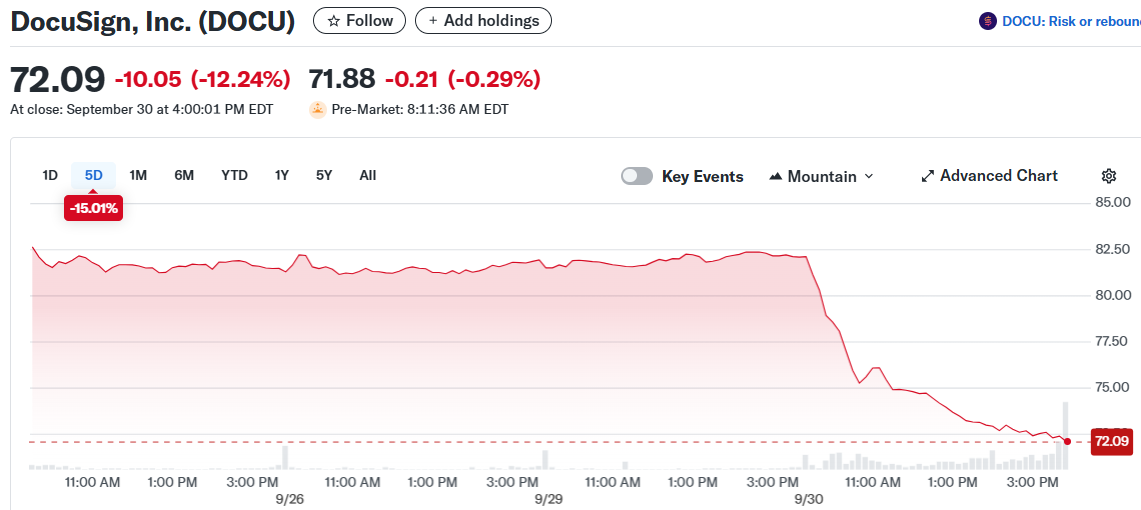TLDR
- DocuSign stock dropped 11.7% to 12.2% on Tuesday after OpenAI announced DocuGPT, a new AI-powered contract management tool
- DocuGPT converts contracts into structured, searchable data and OpenAI claims it cuts their contract management work in half
- The new AI agent can flag non-standard contract terms and improves with human feedback over time
- Wall Street maintains a Moderate Buy rating on DOCU with a price target of $97.14, suggesting 34.8% upside potential
- Experts believe it may take years for DocuGPT to seriously challenge DocuSign’s dominance due to established customer loyalty and trust requirements
DocuSign stock took a beating on Tuesday, falling as much as 12.2% in trading. The drop came after OpenAI revealed DocuGPT during its weekly presentations about internal AI tools.

OpenAI’s new product targets the same market DocuSign dominates. DocuGPT transforms contracts into organized, searchable databases. The system runs through multiple steps combining automated AI functions with human review.
OpenAI says DocuGPT slashes their contract management workload by half. The tool also creates cleaner databases of contract terms. Beyond contracts, OpenAI sees DocuGPT working with other financial documents too.
The timing caught investors off guard. DocuSign has built its business around digital agreements and e-signatures. Now a major AI player is stepping into that space.
DocuGPT can spot unusual contract terms and explain why they stand out. Each round of human feedback makes the system sharper. The tool stores data in table format, making analysis easier down the road.
What DocuGPT Means for Competition
OpenAI positioned DocuGPT as part of their agentic AI strategy. The company uses these tools to run their own operations more efficiently. They called it “a blueprint for how AI can responsibly transform regulated, high-stakes work.”
The feature set looks similar to DocuSign’s recent AI-powered platforms. Both focus on extracting and organizing contract data. DocuGPT might need to catch up on secure signature processes, but it covers general data management well.
The market reacted quickly to the news. Investors dumped shares throughout Tuesday’s session. The selloff reflected worries about DocuSign’s competitive position going forward.
Trust and Market Position
Some analysts think the panic might be overdone. DocuSign has spent years building trust with clients who handle sensitive documents. Property deeds, legal agreements, and financial contracts require proven security.
OpenAI adapted ChatGPT technology for this new use case. DocuSign built its AI features specifically for secure data management from the start. That difference matters when clients decide who handles their important papers.
Convincing DocuSign’s customer base to switch could take years. The company maintains strong loyalty among existing users. Trust doesn’t transfer overnight in the contract management business.
Wall Street analysts remain cautiously optimistic on DOCU stock. Six analysts rate it a Buy while ten recommend Hold. Their average price target sits at $97.14.
That target price represents 34.8% upside from current levels. The rating consensus is Moderate Buy. Analysts point to DocuSign’s market dominance as a key strength.
DocuSign has also been adding AI capabilities to its own products. The company hasn’t stood still while competitors developed new tools. Integration of AI features continues across its platform.
Tuesday’s drop wiped out recent gains for DOCU shareholders. The stock now trades well below analyst targets. OpenAI’s announcement came during a week of AI-focused presentations from the company.






